Thursday, August 31, 2006
Time for the 'Men in Flat Caps' to Knock on Tony's Door
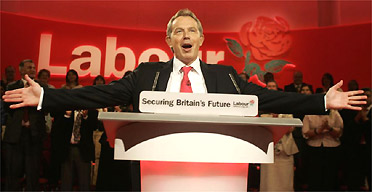 I wasn't surprised to read that MPs are plotting to force Blair to announce an exit date at the forthcoming conference. In fact, I've been predicting such background moves for some time. My small contact with the grass roots (and as a constituent part of them) has made me realise how much Blair has outstayed his welcome. On Tuesday came a well argued piece by Polly Toynbee on the 'mutinous mood growing' in the party at all levels.
I wasn't surprised to read that MPs are plotting to force Blair to announce an exit date at the forthcoming conference. In fact, I've been predicting such background moves for some time. My small contact with the grass roots (and as a constituent part of them) has made me realise how much Blair has outstayed his welcome. On Tuesday came a well argued piece by Polly Toynbee on the 'mutinous mood growing' in the party at all levels. She made the point that in the face of the recent barrage of criticism, the 'Blairite' defence of the man in charge amounted merely to flat-mate Falconer and arch loyalist Tessa Jowell; the rest, even John Reid, ever keen to apply his soothing tongue to Tony's offended areas, kept heads well below the parapet. She concludes that it's time, even before the conference, for 'delegations of ministers and MPs' to 'quietly but forcefully tell him to go.' The Guardianleader on the same day bleakly concluded that: 'He appears prepared to pay almost any price to retain his vestigial authority so that he can leave at a moment of his own choosing next year' In other words it's time for the 'men in flat caps' to knock on Tony's door and tell him it how it is in the party. Neil Lawson today reinforces the necessity of such a move if Labour wants to have any chance of winning the next election.
And then again today we see Patrick Wintour reporting an attack by the brooding Charles Clarke on the 'imposition' of flawed policies on the party. He is especially worried by the apparent fait accompli without consultation on renewing Trident and investing in more nuclear power. Wintour also sees the article in the New Statesman as part of the bulky politician's upcoming bid for the leadership. With all this brewing Labour's Manchester conference threatens/promises to be the most combustible party conference since 1963 when it was dear old Macmillan's crown being contested. And what an unexpected result that produced.
Wednesday, August 30, 2006
Ambassador's Subversive Wit
 My picture shows our man at the UN seeking to make a point. We often think such diplomats, schooled in the dry ways of the Whitehall machine are incapable of making any joke let alone an off-colour one but I have happened upon a rather wonderful example of one such, courtesy of my mate Mike in Aberystwyth, involving Sir Archibald Clerk Kerr.
My picture shows our man at the UN seeking to make a point. We often think such diplomats, schooled in the dry ways of the Whitehall machine are incapable of making any joke let alone an off-colour one but I have happened upon a rather wonderful example of one such, courtesy of my mate Mike in Aberystwyth, involving Sir Archibald Clerk Kerr. This diplomat was posted to Moscow in 1942 where he established a very close relationship with Stalin and became a central figure in the Big Three conferences at the end of the war. He went on, as Baron Inverchapel, to be crucially involved in the Marshall Plan. But this Aussie born Scot was no ordinary Establishment clone. He was anti-imperialist(maybe his unsccessful wooing of the Queen Mother contributed to that) and a leftwinger who went on to marry a Chilean lady 29 years his junior. Something of his subversive character is evident in this priceless billetdoux sent back home from wartime Moscow. For the original text see here.
From:H.M. EMBASSY
Moscow
To: Lord Pembroke
The Foreign Office
LONDON 6th April 1943
My Dear Reggie,
In these dark days man tends to look for little shafts of light that spill from Heaven. My days are probably darker than yours, and I need, my God I do, all the light I can get. But I am a decent follow, and I do not want to be mean and selfish about what little brightness is shed upon me from time to time. So I propose to share with you a tiny flash that has illuminated my sombre life and tell you that God has given me a new Turkish colleague whose card tells me that he is called Mustapha Kunt.
We all feel like that, Reggie, now and then, especially when Spring is upon us, but few of us would care to put it on our cards. It takes a Turk to do that.
[signed]
Sir Archibald Clerk Kerr,
H.M. Ambassador.
Tuesday, August 29, 2006
Kelly Sounds Death Knell for Multiculturalism
 Ever since the 2001 race riots in the northwest, 7-7, massive inflows of immigrants and the recent crisis over the alleged British Muslim based plots to down aircraft destined for the USA, the doctrine of multiculturalism has been under close scrutiny. In essence this extends an evenhanded approach to incoming cultures, allowing them to co-exist with the host culture on an equal basis, retaining their rights to worship and use their own languages. At its best this produces the vivid ebullience of the pictured Notting Hill Carnival but at its worst it produces segregated communities which have little contact with anyone else and where, it is argued, hostility to the host country can be nurtured and force-fed into murderous intent.
Ever since the 2001 race riots in the northwest, 7-7, massive inflows of immigrants and the recent crisis over the alleged British Muslim based plots to down aircraft destined for the USA, the doctrine of multiculturalism has been under close scrutiny. In essence this extends an evenhanded approach to incoming cultures, allowing them to co-exist with the host culture on an equal basis, retaining their rights to worship and use their own languages. At its best this produces the vivid ebullience of the pictured Notting Hill Carnival but at its worst it produces segregated communities which have little contact with anyone else and where, it is argued, hostility to the host country can be nurtured and force-fed into murderous intent.Writing in Prospect magazine, early last year, David Goodhart, a solid member of the liberal elite, questioned this approach and suggested it should be dismantled. Last week Ruth Kelly's announcement of the Commission for Integration and Cohesion [incidentally, am I alone in thinking her lectern speaking style is a perfect example of how not to do it?] indicated that this left of centre government has made a massive U turn on multiculturalism and aims to discover a new route to national ethnic harmony, if indeed there is one. 'Cohesion and Integration' represent something very different from the absorption of separate cultures entailed in the former politically correct multicultural approach; from separation and autonomy we have moved to two opposing concepts.
Writing in the Sunday Times, Rod Liddle enjoys putting the boot into this dramatic leftwing reversal of position. I don't often agree with the self regarding Liddle nor with everything in his article yesterday, but his reflections on the irony of Ray Honeyford's 1986 fate resonated with me. I recall sharing something of the general feeling at the time that this northern headmaster's suggestion that his Asian pupils should learn English, plus some British history amounted at least to a form of 'neo-racism'. For his article in the tiny rightwing Salisbury Review, Honeyford was pilloried mercilessly and eventually forced to retire.
Yet surely, those of us on the left who criticised him were wrong and owe him some sort of an apology? Of course those were the fevered years of Thatcherism and the battle lines of those days brooked little genuine reflection or quarter given. But on grounds of natural justice alone there is at least an a priori case for suggesting Honeyford be invited to sit on Kelly's Commission. Even if it were offered I doubt if he'd accept.
Sunday, August 27, 2006
Falconer Rallies Blairites
 I've just heard Charlie Falconer debating Amicus's Derek Simpson about the future direction of Labour. Simpson wants to junk the pro-private sector reform of public services and see a new direction in foreign policy too. His argument is that without such a change Gordon Brown will never win the next election. Falconer rejected this as a return to disastrous 'Old Labour' policies-a specious interpretation of Simpson's case I thought- as well as rejecting the implied suggestion that Blair should go now rather than some unspecified later date.
I've just heard Charlie Falconer debating Amicus's Derek Simpson about the future direction of Labour. Simpson wants to junk the pro-private sector reform of public services and see a new direction in foreign policy too. His argument is that without such a change Gordon Brown will never win the next election. Falconer rejected this as a return to disastrous 'Old Labour' policies-a specious interpretation of Simpson's case I thought- as well as rejecting the implied suggestion that Blair should go now rather than some unspecified later date.My feeling is that the leadership has got wind of moves planned for the forthcoming conference to force Blair to go. Charlie has offered his own jovial head above the parapet to fire a few salvos at the still organizing forces of the left. Falconer, former flatmate of the PM, relies wholly upon his personal patronage for his position of considerable power and influence. It follows that without his patron in Number 10, his time in the spotlight of power will instantly be over.
So he argues that to change a prime minister only fifteen months after a general election is too soon. He may be right but more likely, in my view, is that it's already several months too late. Blair had had his time, voters are bored, exasperated and in many cases, disgusted with him and his policies. He should use the conference to explain precisely when in the near future, he's going to stand down and allow an election for his successor.
Saturday, August 26, 2006
Should Hair 'Ransom Demand' Mean Ball Tampering Issue is Forgotten?
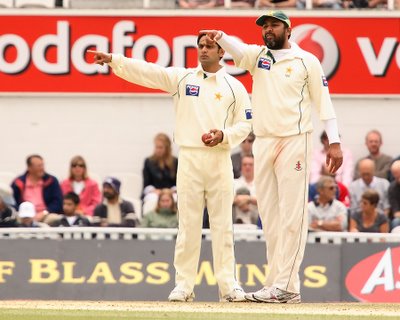
It now seems as if the controversy over ball tampering is over, given that Darrell Hair has compromised himself by suggesting half a million bucks would rid the ICC of this troublesome umpire. The Pakistanis feel jubilantly vindicated and the one day matches will take place, saving cricket up to £10 million. But I'm not so sure that the fracas is truly fully over and can see some reason to continue with the enquiry into the ball tampering accusation. Two questions:
1. Was Hair holding the ICC to ransom? One school of thought suggests he deliberately staged the affair with a cash pay-off in mind. I'm sure this was not the case. He has recently spoken of continuing to umpire until the end of his contract in 2008 and setting up such a 'scam' would not be in any way consistent with his behaviour to date. More likely it was the action of a man, despite his outward impression of calm resolution, who was shaken by the consequences of his own decision. Whatever the motive, it proved to be a monumental misjudgement as it makes him appear, fatally, as venal and touched by corruption. His career was already in doubt before his emails were sent but after they was made public it has gone for good, at least at the international level.
2. Will the ball tampering accusation fade away by default? At present it looks like it will. But if there was good reason to suspect the Pakistan team then surely the case should be proceeded? In his Times piece today CMJ says that Hair 'became suspicious that the ball was swinging unusually' and that when he inspected the ball he concluded the 'marks on one side of the ball were the result of dleiberate scratching and lifting by the fingers or thumbnail by one of the Pakistan players.'
Surely Hair's original suspicions should not be left on the table uninvestigated? If there is evidence of something amiss, it should be thoroughly looked into for the sake of the game's future. If Hair has ruined his own distinguished career then the original cause should not be allowed to drift or be swept under any carpet.
Friday, August 25, 2006
Northern Lights Voter Ingratitude Warning for Labour
 I've always been a huge fan of Sweden and -along with Anthony Crosland(who never, like me, had a Swedish wife and half Swedish son)-of the Swedish route to socialism. So I was very interested the article by Polly Toynbee today on lessons Gordon brown should learn from the upcoming election in this shining(if rather smug) welfare paradise to our north. Sweden has an annual growth rate of 4.5 per cent, superb public services including the best childcare in the world, a high fertility rate, the highest level of public trust and, to cap it all off, top position in the international happiness league.
I've always been a huge fan of Sweden and -along with Anthony Crosland(who never, like me, had a Swedish wife and half Swedish son)-of the Swedish route to socialism. So I was very interested the article by Polly Toynbee today on lessons Gordon brown should learn from the upcoming election in this shining(if rather smug) welfare paradise to our north. Sweden has an annual growth rate of 4.5 per cent, superb public services including the best childcare in the world, a high fertility rate, the highest level of public trust and, to cap it all off, top position in the international happiness league. Yet Goran Persson, a bit like his 'Goran' football manager compatriot in this country, is not much rated in his homeland. And it seems 41 year old Fredrik Reinfeldt, the new media friendly leader of the rightwing Moderate Party is busy stripping the Social Democrats- in power for much of the last 80 years- of their centre ground portfolio of policies. Sound familiar?
It seems the political party which has provided the main tenets of Sweden's liberal political culture and given it such enviable public services not to mention high standard of living, is lagging behind the Moderates by a margin never overhauled beofre three weeks from polling day. The Moderates' take on globalization- that it is incompatible with welfarism which should be outsourced and substituted by charity and social enterprise- sounds a bit the noises coming from our very own Tories; if the right win in Sweden, stand by for the volume of such messages to be racked up a few notches.
Polly ends by gleaning a warning from Sweden for Labour: Blairite banalities will never win over modern British voters: 'Even if the economy thrives better than he, Brown dared hope, even if almost every public service is improving, even if most people are better off and secure in their jobs too- that's still not enough'. As I wrote recently, voters have decided to take their economic good fortune for granted. It seems Swedish voters have decided to be similarily ungrateful.
Thursday, August 24, 2006
Tony Blair's Real Legacy

I've written more than once about Blair's legacy- he is so obsessed with it after all- but was provided with a new slant on it by a French commentator today. Agnes Poirier suggests that the political trajectory of Blair since 1994 has not just changed British politics but profoundly affected wider European politics too. She suggests that Blair's practice of 'campaign to the left, govern from the right' has influenced Romano Prodi's government in Italy- already implementing rightwing reforms which eluded Berlusconi- and informs the pathways to power envisaged both by French socialist Presidential hopeful Segolene Royal and the even more upper class David Cameron over here.
Blair certainly seems to provide the template for the latter and I fully expect him to continue ploughing the furrows of social justice and inclusiveness; low interest and flexible employment on the economic side; and further 'modernization' through private sector involvement on public services. An interventionist foreign policy is the only policy area I expect Cameron to avoid as far too risky: it worked in Kosovo and Sierra Leone but proved a disaster in Iraq. It all depends how closely he chooses to follow the lead of Washington but I suspect that in his case if he wins the next election- not to mention the likely earlier one of Gordon Brown- Blair's legacy of blind obeisance to the White House will be smartly ignored if not overturned. And that will go for his European imitators as well.
Wednesday, August 23, 2006
So Wrong to deny Brown Credit for Economic Success
 Never expect gratitude in politics; at least not if your name is Gordon Brown. And ICM poll in the Guardian today, reveals that much of his work since 1997 has not been credited by voters for the success it has produced: 52 per cent say they do not think he has been responsible for the record of constant growth over nine years; and 55 percent do not think their families are better off since Labour came to power(though two thirds of the 41 per cent who do are Labour supporters).
Never expect gratitude in politics; at least not if your name is Gordon Brown. And ICM poll in the Guardian today, reveals that much of his work since 1997 has not been credited by voters for the success it has produced: 52 per cent say they do not think he has been responsible for the record of constant growth over nine years; and 55 percent do not think their families are better off since Labour came to power(though two thirds of the 41 per cent who do are Labour supporters). Despite the fact that 59 per cent are confident in their financial position, 83 per cent believes it is now harder than in 1997 to find a house and 57 per cent harder to find a job. To cap it all 41 per cent think Labour's policies have made little difference to the state of the economy. Put simply, these are an extraordinary set of poll findings. My memory goes back to a series of economic mismanagements: in the sixties under both parties; during the seventies, again under both parties; two major recessions bookending the eighties under Thatcher(despite her 'brilliant' Chancellor, Lawson); a severe recession during the nineties under Major; and since 1997? Well...not.
Of course, the government can only exhort and exert influence on the economy to perform well but macro-economic policy can either make or break the degree of prosperity which the nation enjoys. Certainly Brown benefitted from an economy which had been well set up, by Ken Clarke after the serial failures of his predecessors, but to sustain growth in the face of turbulence like: the implosion of the Asian Tigers, the shares crash occasioned by the bursting of dot.com bubble, the various terrorist atrocities since 9-11 and the huge hike in oil prices caused partially by the rash of wars the world has suffered in recent years, is a political achievement to rank with the most astonishing since the end of the second world war.
Even Conservative politicians are prepared to recognise the Chancellor's expertise, so why should voters be so blindly determined to deny Brown his richly earned credit? I can think of a few reasons:
i) they have not warmed to the dour, undemonstrative Scot.
ii) they have become so used to a sound economy and low unemployment that they now take it for wholly for granted as a 'given' of daily life.
iii) they have not the slightest idea how the nation's economy works.
iv) they are so disillusioned with Labour after Blair's political mismanagement that they are not prepared to allow them even the slightest credit for anything at all. The Guardian's poll yesterday gave the Conservatives a nine point lead: 40 per cent to Labour's 31, so maybe this last explanation has more than a tiny slice of the truth in it. Whatever the reasons, it reflects crass ingratitude by voters and bodes ill for Brown's upcoming contest for the leadership, and, if he gets it, winning the next election.
Tuesday, August 22, 2006
Blair-Brown Rivalry Discussed by Old Hands

 Much has been written about the rivalry between Blair and his Chancellor- not least a full length book by James Naughtie- so I suppose I shouldn't be too surprised to hear what for me was final confirmation that they really do hate each other. Maybe I was naive enough to believe that staged chumminess during the last election campaign- you remember the fraternal chat, the smiles and the shared ice-creams?- had some basis in fact. Also I'm aware that journalists thrive on stories about splits and tiffs and so treated a large number of those stories with justified scepticism.
Much has been written about the rivalry between Blair and his Chancellor- not least a full length book by James Naughtie- so I suppose I shouldn't be too surprised to hear what for me was final confirmation that they really do hate each other. Maybe I was naive enough to believe that staged chumminess during the last election campaign- you remember the fraternal chat, the smiles and the shared ice-creams?- had some basis in fact. Also I'm aware that journalists thrive on stories about splits and tiffs and so treated a large number of those stories with justified scepticism. But this morning, listening to Between Ourselves, my few remaining doubts disappeared. On the programme were the immensely experienced and wise journalists, Elinor Goodman, former political editor Channel Four and Trevor Kavanagh, former political editor The Sun (and always the best thing in it to my mind). At the end of much talk about the exhausting mechanics of being a constantly on-call senior news media person they alighted on the subject of the relationship between Brown and Blair. Goodman reported th experience of her husband who worked an economic adviser to the PM. According to him Brown was extraordinarily secretive about the economy of the country his colleague led, keeping mum about the budget until the very last minute. Kavanagh chipped in with the observation that when writing notes on the Front Bench, he used to shield it with his hand, even when the person sitting next to him was David Blunkett.
They both agreed Brown acquired the politically astute habit of disappearing from view when the going got tough, leaving Blair to carry the can unassisted. [It seems he's been doing that all August until we realize he's currently on paternity leave.] Kavanagh opined Brown would prove a dour authoritarian prime minister, stamping down on any minor transgression from the government line. And what he would never, ever tolerate for a second would be a colleague who regularly took issue with the PM and treated his department as the equivalent of an autonomous state. In other words he'd never allow another..er..Gordon Brown in his Cabinet. Kavanagh predicted, for good measure, that after a few weeks or months of Brown as PM, Labour MPs would be clamouring for Blair's return.
Monday, August 21, 2006
A Very Bad Hair Day for Cricket
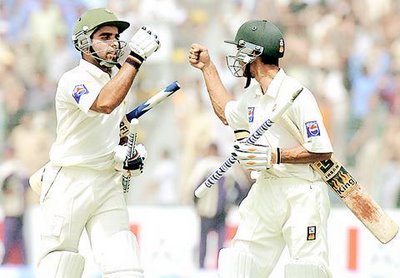 Being a cricket fan of obsessive intensity I have had to discipline myself not to write about it on the grounds that my blog is not the appropriate place to expose my summer game addiction. However, it seems events yesterday have catapulted the sport to item number one in the news; it was all over the Today Programme and the news bulletins this morning, not to mention the press. So here is my take on the vexed 'ball tampering' issue.
Being a cricket fan of obsessive intensity I have had to discipline myself not to write about it on the grounds that my blog is not the appropriate place to expose my summer game addiction. However, it seems events yesterday have catapulted the sport to item number one in the news; it was all over the Today Programme and the news bulletins this morning, not to mention the press. So here is my take on the vexed 'ball tampering' issue. 1. This is as much an umpiring issue as anything else. Darrel Hair has long been a bete noir of Pakistani cricketers for his supposed bias and tendency to make controversial decisions at the expense of their side. Allegedly too, his attitude to the tourists in the aftermath of their tea-break delay, was less than respectful. I would also say that a number of decisions of dubious merit went our way rather than Pakistan's during this series; I welcomed them at the time though with that guilty feeling all cricketer supporters will recognize.
2. Both umpires, led apparently by Hair, did not issue any warning to the players regarding possible ball tampering so that the problem, if any, could be nipped in the bud. Nor have they been specific regarding who might have committed a sin which at this level is seen as heinous. A cricket ball can and does get scuffed over time and the question of how the ball became so changed is crucial. As far as I could see on the TV, it looked no different from how any ball might look after a few dozen overs. The vastly experienced commentators on Sky Sports failed to spot anything suspicious and, one assumes, neither did those in charge of the broadcasts. Would it not be possible for the ball to be tested forensically for any human interference?
3. Initially it was Inzie's boys who refused to come out to play, but when both sides were prepared to do so it was the umpires who took umbrage and insisted the game had already been forfeited according to the rules. For the umpires to deny 20, 000 plus paying spectators in the ground, not to mention millions via television, the chance to view the denouement of an exciting match was shameful, especially as no explanation was given out over the tannoy and that it seemed the question at issue was merely the pride of umpires refusing to be challenged.
4.The International Cricket Council, seldom a body capable of quick and effective decisions, will now labour over the afermath but the key issue will be on what grounds Harrel Hair made his original decision. If his explanation fails to satisfy, then this vastly experienced but always controversial Australian international umpire will surely have kissed his career goodbye.
Sunday, August 20, 2006
Labour Leadership Race Hots Up


With so much happening in the Middle East and, potentially, within our home Muslim community, it's easy to forget we have some political excitement of our own in the form of the forthcoming Labour party conference to be held in my home city of Manchester. Michael Portillo in the Sunday Times today suggests John Reid is moving up slowly but surely on the inside track while the form horse Gordon Brown fails to make much progress. I tend to agree Reid has greatly strenghened his position.
First, as someone who has served as S of S for Scotland, Northern Ireland, Health, Defence and currently a high profile Home secretary, he knows his way around the departments and probably feels confident he can conduct the whole orchestra should the chance arise. Second, he bears no love for Brown with whom he crossed swords in the brutal political battle-ground that is Scottish Labour politics. Reid has nothing to lose as if Brown gets in, as expected, Reid could quickly sink without trace. I suspect in addition, Reid would welcome landing a political headbutt on his old adversary. Thirdly Reid, on the strength of his lead role in the aircraft security crisis is flying relatively high in the political satisfaction polls, leaving not only Blair and Brown behind but the wunderkind Cameron too as the excellentMike Smithson illustrates on his tracker graph.
And so we come to the PM himself. We learn from Andrew Rawnsley that the deadline for a formal challenge to Blair before the conference has passed but I sense that Blair will face his toughest ever party experience. In the past his soaring rhetoric has won the day, however windy its content; but I feel the atmosphere has shifted fundmentally in the last year. Labour MPs and activists are by no means ready to hand over the reins to the Old Etonian just yet, but Blair has so squandered his political capital he is in dire trouble.
This he has done through aping Tory policies, invading Iraq, sitting on his hands while the Lebanese civilians were being slaughtered and generally tugging his forelock to his 'boss' in Washington. Rawnsley speculates on the impact of a call for him to go by, say, 100 Labour MPs. I never expected the formal machinery of the party to be used as the means of ejecting Blair- it is too bureaucratic and politically damaging; informal measns are just as good.
Under our flexible constitution the PM cannot survive if sufficient members of the governing party wish to see him or her exit the stage. Mike Smithson records that the MORI poll in the Sunday Times shows 47 per cent want him to go now while 56 per cent want him to go before the end of the year. He also thinks the 6.2-1 odds on him taking the latter option is a pretty good bet. I'm no gambler but think that on this he is dead right.
Saturday, August 19, 2006
Are British Muslim Terrorists their Equivalent to Football's 'Hooligans'?
 This morning on the Today Programme, John Humphrys interviewed three young, very bright British Muslims about their attitudes to those within their midst who have been involved in terrorism. At one stage this highly intelligent trio described such people as 'using' the Muslim religion as a cloak for the revolutionary ideas which provided their real motivation. They also described them as their 'hooligans', comparable to the yobs who disfigured football in the eighties and nineties.
This morning on the Today Programme, John Humphrys interviewed three young, very bright British Muslims about their attitudes to those within their midst who have been involved in terrorism. At one stage this highly intelligent trio described such people as 'using' the Muslim religion as a cloak for the revolutionary ideas which provided their real motivation. They also described them as their 'hooligans', comparable to the yobs who disfigured football in the eighties and nineties. I'm not sure either claim survives close analysis. The 7-7 terrorists seemed to be devout Muslims who had made the journey, principally through their religion rather than any political ideology, to the radical point where they chose to martyr themselves in the process of taking dozens of innocent British lives. The suggestion that such people are aberrant mavericks also fails to measure up.
The Economist, this week contains a report which cites polls showing 19 per cent of British Muslims(that's a third of a million people) 'respect' Osama bin Laden while 13 per cent regard the 7-7 bombers as 'martyrs'. It really seems that this putative 'hooligan' element extends quite deeply into the 1.8 strong Muslim community. The BBC hoped their panel of young Muslims would provide some fresh new and authentic input into the debate but this first consultation merely expressed how divided and confused British Muslims are about their own attitudes on the central and crucial question: how much support the terrorists within their ranks receive from the community as a whole?
Thursday, August 17, 2006
It's Official: 'Bush is Crap' says Prescott

 In a private meeting with MPs Harry Cohen, Neil Gerrard and others, we learn John Prescott opined that George Bush as 'crap'. Prezza met some backbench MPs to discuss the terror crisis and shared this teensy apercu with them. Harry Cohen, true to his more maverick sympathies, later spilt the beans; the whips will deliver a verbal spanking for that transgression- not that it will have any effect whatsoever. Will Woodward, who wrote the resultant piece in The Guardian, says the DPM's view 'is standard among Labour backbenchers and is held widely in the Cabinet'.
In a private meeting with MPs Harry Cohen, Neil Gerrard and others, we learn John Prescott opined that George Bush as 'crap'. Prezza met some backbench MPs to discuss the terror crisis and shared this teensy apercu with them. Harry Cohen, true to his more maverick sympathies, later spilt the beans; the whips will deliver a verbal spanking for that transgression- not that it will have any effect whatsoever. Will Woodward, who wrote the resultant piece in The Guardian, says the DPM's view 'is standard among Labour backbenchers and is held widely in the Cabinet'. My complaint is not that such a view is in any way wide of the mark but that what we've been told is too broadbrush. I would have liked to hear some more detail, some elaboration from the repository of Labour's working class conscience. Like most Labour Party members I'm seething, full-time, about the guy and have been since before he was falsely elected. I can only imagine how Labour backbences must loathe the man who is probably going to deny them re-election some time in the future. Also, if Harry thinks Bush is 'crap', what adjective would he use to describe Tony?
Tuesday, August 15, 2006
The Implications of Israel's Failure
 A BBC report from Israel yesterday quoted one wag as saying that Ehud Olmert had 'began the war like Churchill and finished it like Chamberlain'. Indeed, as Martin Jacques pointed out yesterday, Israel seem to have failed-he suggests 'lost'is not too strong a word- in its long planned war against Hezbullah. Whilst they sought a few more days to 'finish off' the pesky Shia militants, more than a month of fighting passed and the enemy emerged apparently just as strong at the end and able to boast a famous victory. Whatever else they have lost Israel has suffered a major propaganda reverse. Jacques points out that, as the US have discovered in Iraq, mere military muscle and firepower are nowhere near enough when the hearts and minds are so thoroughly opposed.
A BBC report from Israel yesterday quoted one wag as saying that Ehud Olmert had 'began the war like Churchill and finished it like Chamberlain'. Indeed, as Martin Jacques pointed out yesterday, Israel seem to have failed-he suggests 'lost'is not too strong a word- in its long planned war against Hezbullah. Whilst they sought a few more days to 'finish off' the pesky Shia militants, more than a month of fighting passed and the enemy emerged apparently just as strong at the end and able to boast a famous victory. Whatever else they have lost Israel has suffered a major propaganda reverse. Jacques points out that, as the US have discovered in Iraq, mere military muscle and firepower are nowhere near enough when the hearts and minds are so thoroughly opposed.He goes on to meditate on the US-Israel faith in brute military strength and to hope this failure to quell Hezbullah will 'force a rethink among Israelis on the best means to secure their future.' The reason why they face such fierce hostility is that Israel has never tried to fit into 'the region, politically, culturally or ethnically'. It has always been part of the western world transplanted into alien territory and 'sustained by an American life support machine'.In the circumstances the Arab world has become 'embittered, divided and politically frozen' reliant on a terrorism which is always 'the weapon of the impotent, the disenfranchised and the unorganised in the face of profound grievance'.
Jacques concludes Arab states have to accept Israel's right to exist while Olmert's country 'must come to see itself as an integral part of the region' and evolve away from its-ironic this- 'sense of racial superiority' to the arabs whom they regard as 'less civilised than themselves.' Given that- as Jacques admits- the state of Israel came into being through the annexation of land that was arab and that the resultant ethnic state embodied attitudes of exclusivism and racism, the hope that this recent defeat will help Israel to view the arabs 'as equals seeking to live in peace' seems optimistic indeed. One hopes he is both correct and prescient but I suspect Mr Olmert's failure to cut it as a war leader means will not long survive to attempt any change of direction.
Monday, August 14, 2006
Hersh Supports Early Blogosphere Claims on Lebanon War
 Last Wednesday I posted on how blogosphere sources had questioned the received wisdom that it was Hizbullah which precipitated the war in the Lebanon, citing sources which claimed Israel had tested out its plans to neutralize the Shia organization several months in advance of the outbreak of hostilities. I argued we needed more evidence to support blogosphere claims and now, it seems, we have it. Dan Glaister, today supports the Israeli-US collaboration analysis by drawing on the work of the veteran investigative reporter, Seymour Hersh(pictured) who claims in the New Yorker:
Last Wednesday I posted on how blogosphere sources had questioned the received wisdom that it was Hizbullah which precipitated the war in the Lebanon, citing sources which claimed Israel had tested out its plans to neutralize the Shia organization several months in advance of the outbreak of hostilities. I argued we needed more evidence to support blogosphere claims and now, it seems, we have it. Dan Glaister, today supports the Israeli-US collaboration analysis by drawing on the work of the veteran investigative reporter, Seymour Hersh(pictured) who claims in the New Yorker:'several Israeli officials visited Washington earlier this summer to get a green light for the bombing operation and to find out how much the United States would bear.'
Hersh further claims that the US were keen to weaken Hizbullah's ability to attack Israel should USA decide to 'destroy Iran's nuclear installations'.
So the Lebanon war was to be a feint/prelude to a possible attack on the real target: Iran. It seems the mainstream media can indeed get it (or be manipulated to get it) wrong. And maybe it takes the bloggers to seek out and publicize the alternative narratives which eventually turn out to be closer to the truth. Pity, in retrospect, though not at all surprising, that it yet another best laid US plan for the Middle East has gone ever so slightly pear-shaped. But the more important worry is whether the embryonic plan to attack Iran has been abandoned or flagged for implementation in the near future. Straw condemned such a plan in advance as 'nuts' but I wonder what combination of weasel words Blair would use to justify going along with Bush in such a dangerous new direction.
Sunday, August 13, 2006
British Terrorists Baffle Attempts to Understand Them
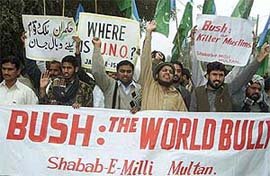 I've just got back after some days away and can't really post on anything except the airlines terror plot and British Muslims. The aspect concerning me is well covered in the press today. The Sunday Times editorial considers the 'enemy within' which seeks to 'destroy our way of life.' It notes the estimated 1200 involved in 'terrorist networks' together with the fact that they are drawn both from educated,well integrated middle class families as well as the Muslim underclass.
I've just got back after some days away and can't really post on anything except the airlines terror plot and British Muslims. The aspect concerning me is well covered in the press today. The Sunday Times editorial considers the 'enemy within' which seeks to 'destroy our way of life.' It notes the estimated 1200 involved in 'terrorist networks' together with the fact that they are drawn both from educated,well integrated middle class families as well as the Muslim underclass. Some blame British foreign policy for this tragic development and certainly Blair and his ministers have not helped matters by their policies relating to Iraq and the Lebanon. But this is too facile a judgement. Firstly foreign policy sometimes has to ignore public opinion; to tie Foreign Secretaries' hands through fear of a terrorist backlash at home surely cannot be right. Secondly, there is a world of difference between objecting- as illustrated by my pictures on this and the previous post- to a foreign policy and coldly planning to murder thousands of people because of it. This is the nub of the issue for me.
What is it which causes well integrated, prosperous young Muslims to bale out of the society which has helped nuture them-not forgetting its many many flaws- and to translate anger over a government actions into such murderous intent? It's a huge amount of ground to taverse that: anger to mass murder. Between the feeling of anger to the execution of the act is a mountain range of moral questions of Himalayan proportions.
How does it happen? Two articles in The Observer address the topic. Safraz Manzoor ponders how and why Sajid Mahmood, a Pakistani by origin England fast bowler was booed and called a 'traitor' by elements in the Headingley crowd. What country did they expect him to play for when he was born here?
Jason Cowley suggests understanding of how people can make this journey can best be derived from fiction and mentions a number of novels which might help enlighten us.
I'm prepared to read and think and ponder but have to confess that for the here and now, I'm angry, bewildered and totally unable to understand how our own fellow citizens can even contemplate such horriffic criminal acts.
Thursday, August 10, 2006
Alienation of British Muslims Becoming an Acute Worry
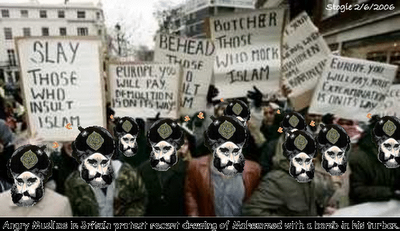 There can be little doubt, in contradiction to the claims of Blair in the wake of the 7/7 bombings, that his foreign policy has enraged and alienated indigenous UK Muslim opinion. Another top rate article by Tomothy Garton-Ash in today's Guardian explores this worrying trend in some depth. He reports the Channel 4 documentary fronted by John Snow which cited a poll in which almost a third of British Muslims agreed that the 7-7 bombings were justified 'because of British support for the War on Terror'.
There can be little doubt, in contradiction to the claims of Blair in the wake of the 7/7 bombings, that his foreign policy has enraged and alienated indigenous UK Muslim opinion. Another top rate article by Tomothy Garton-Ash in today's Guardian explores this worrying trend in some depth. He reports the Channel 4 documentary fronted by John Snow which cited a poll in which almost a third of British Muslims agreed that the 7-7 bombings were justified 'because of British support for the War on Terror'. Other figures were as alarming and depressing: one third of those aged 18-24 said they would prefer to live under Sharia rather than British law; only half said they thought of Britain as 'my country'; and 81 per cent said they saw themselves as Muslims first and British second, a higher proportion than that registered in Jordan, Egypt or Turkey and exceeded only in Pakistan.
Garton-Ash adds than at least part of the Muslim critique of our society is 'true' citing 'we drink more alcohol faster, sleep around more, live less in long-lasting, two-parent families, and worship less than almost anyone in the world.' If he is claiming our 'libertine' lifestyle provides a justification for Islamic dislike of their host country, I'm not sure I agree. Surely, if one does not share religious restrictions on such behaviour then it is the personal sense of conscience and social responsibility to which one is accountable?
That we should have within our midst a significantly large group of young, second generation immigrants, who appear to hate our guts seems like a recipe for a number of seriously bad future developments: growing indignation and reciprocal alienation among even the most liberal minded Brits; increasing involvement of British Muslims in terror-related activity as the current air travel scare seems to illustrate; and a growing risk that the Pandora's Box of racism will be opened up with disastrous consequences.
Wednesday, August 09, 2006
The Blogosphere and the Hizbullah-Israeli War
 A friend of mine a few days back over a glass or two of wine was dismissive of the 'power' of UK blogging, suggesting that, apart from breaking trivial bits of new gossip, it was mostly merely comment or 'cyber-noise'. I mentioned the blogs recently(see my post for 7th July and comments thereon) which claimed the recent Lebanon war was started, not by Hizbullah, as is the received wisdom, but by Israel who allegedly first seized two hostages from the Lebanon thus prompting the revenge hostage-taking plus the deaths of several Israeli soldiers. He dismissed these claims also, making the point that such 'news', if true would have been picked up eagerly by the mainstream media. I had to admit this was probably the case.
A friend of mine a few days back over a glass or two of wine was dismissive of the 'power' of UK blogging, suggesting that, apart from breaking trivial bits of new gossip, it was mostly merely comment or 'cyber-noise'. I mentioned the blogs recently(see my post for 7th July and comments thereon) which claimed the recent Lebanon war was started, not by Hizbullah, as is the received wisdom, but by Israel who allegedly first seized two hostages from the Lebanon thus prompting the revenge hostage-taking plus the deaths of several Israeli soldiers. He dismissed these claims also, making the point that such 'news', if true would have been picked up eagerly by the mainstream media. I had to admit this was probably the case.Then I read the article yesterday by George Monbiot who made claims similar to those made in the blogosphere that the technical 'aggressor' was as likely to be Israel as Hizbullah and that, as reported in the San Francisco Chronicle that 'more than a year ago, a senior Israeli army officer began giving Powerpoint presentations, on an off the record basis' setting out the plan for a three week attack on the Lebanon based outfit beginning with bombing and ending in a ground invasion. Gerald Steinberg, Professor of Politics at Bar-Ilan University, was quoted as saying this planned three week war was the one-of all the wars since 1948- for which it was best prepared. In other words, Israel had planned the war and was just looking for a pretext.
Does this prove my friend was wrong and that the blogospere was able to provide information denied the mainstream media? Not really as: it was a US newspaper from which the claims were cited; and additional verification is needed for the alleged Israeli officer's presentations. The blogospere is still on the periphery of the mainstream but it is getting closer to the heart of it. Sending tips to Guido is one thing, but it is when he starts receiving leaked government documents or when blogs have the resources to sponsor or particpate in investigative reporting that bloggers will have truly arrived.
Tuesday, August 08, 2006
Will 'Shame Punishment' Cross the Atlantic?
 Plenty of things to pick up on in the media today but, perhaps a bit overdosing with foreign topics recently, the thing which caught my eye was the article by Rachel Shteir on 'shame punishment' in the USA. Originating with Texas Judge Ted Poe, this forces offenders to accept a fair helping of public shame for their misdeeds. This can take the form of shoplifters being forced to write a sign 'I am a Thief' and stand holding it outside the store from which they stole. Or it could be the sign 'violent felons' put up outside the home of those who have so offended. Judge Brown in Tennessee even arranged for victims to steal back from the homes of the those who broke into their residences.
Plenty of things to pick up on in the media today but, perhaps a bit overdosing with foreign topics recently, the thing which caught my eye was the article by Rachel Shteir on 'shame punishment' in the USA. Originating with Texas Judge Ted Poe, this forces offenders to accept a fair helping of public shame for their misdeeds. This can take the form of shoplifters being forced to write a sign 'I am a Thief' and stand holding it outside the store from which they stole. Or it could be the sign 'violent felons' put up outside the home of those who have so offended. Judge Brown in Tennessee even arranged for victims to steal back from the homes of the those who broke into their residences. And it works, apparently, too. According to Poe,only 9 per cent of those 'shamed' broke probation compared to the national average of 50 per cent. But there is a downside. Shaming doesn't solve the drug habits which fuel most property offences and such a punitive approach might turn some offenders even more ferally against society. One can also, moreover, believe such punishment might become the 'badge of honour' ASBOs have to some hardened young malefactors.
Will it cross the Atlantic as so many new American initiatives do? Such an old fashioned 'put 'em in the stocks' approach would seem tailor made for the Conservatives of old but I can just as easily see a Labour Home Secretary, like John Reid, picking up this particular ball and running with it. Just give the idea time to seep into the tabloid consciousness and we'll see... but you read it here first remember.
Monday, August 07, 2006
Bush-Blair: What a Partnership
 The former director of the insider think-tank Demos, Tim Bentley, writes about New Labour in today's Guardian and concludes that though Britain is a 'better, more relaxed, open wealthy, interesting society' its energy has been fatally sapped by the disastrous Iraq adventure and the debilitating struggle for supremacy between Gordon and Tony. From someone who has been so close to New Labour's decisionmaking, this is a penetrating observation. But for me the article with most resonance in recent days was written last Saturday by Emma Brockes.
The former director of the insider think-tank Demos, Tim Bentley, writes about New Labour in today's Guardian and concludes that though Britain is a 'better, more relaxed, open wealthy, interesting society' its energy has been fatally sapped by the disastrous Iraq adventure and the debilitating struggle for supremacy between Gordon and Tony. From someone who has been so close to New Labour's decisionmaking, this is a penetrating observation. But for me the article with most resonance in recent days was written last Saturday by Emma Brockes.She took us back to that time in early November 2004 when US voters queued up to vote. I took the queues as comforting evidence of a huge impending backlash against Bush and was further enthused when an old racing journalist friend- also a dedicated punter- rang up late on the Tuesday night to say, breathlessly, 'Kerry's got it. The bookies are saying so and they know you know.' I turned over and closed my eyes to dream of an America restored to FDR liberalism... but then it was morning. Brockes recalls how we all said things like 'Oh God, what is going to happen to the world?' as if terrible things were about to rain on us, like those biblical frogs from the heavens. But what we secretly thought inside was that by stating the worst case scenario we could insulate the world from reality turning out anything like as bad.
Well, it didn't and it's so much worse than even we feared. I'm not saying it was all the fault of Bush or even his over eager Fettes educated accomplice. Those al Quaeda pilots on their first and last mission have had quite a bit to do with what has happened to the world since then. And Bush's initial reaction, that extraordinary school scene notwithstanding, was regulation, hand on heart, appropriately patriotic. No, it's what's happened in the longer aftermath of 9-11 which has been so depressing and terrifying. Shooting up the Taliban for harbouring Bin Laden was sort of expected: Bush had to kick someone's ass.
That knee-jerk reaction took a little while to start going down the toilet but now we can almost hear the whooshing sounds. Iraq didn't even take that long to assume the proverbial pearshape and after a period of political and military mismanagement unparalleled in my life-time, the death toll in Saddam's former property is 6000 since June as it sinks daily into the predicted horriffic civil war between Shia and Sunni Muslim militias. And now we have the war in the Lebanon. Well done George and Tony; it couldn't and wouldn't have happened without you.
Sunday, August 06, 2006
Is There an 'Arc of Extremism'?
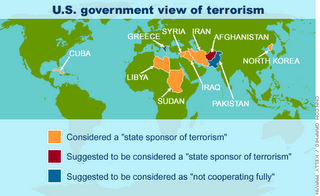 Blair's Los Angeles speech last week spoke of 'an arc of extremism' that includes Hamas, Hezbullah, Syria, Iran and the terrorists in Iraq. The source of the problem? Blair was unequivocal: 'Religious extremism...And not just any religious extremism but a specifically Muslim version.' So it's not in any way 'our fault' but purely a clash of civilisation- presumably he buys the Samuel P Huntingdom analysis- which we have to win using our values to persuade the crucial moderate Muslim opinion. Michael Portillo in the Sunday Times endorses this view of the world, not to mention our prime Minister, and predicts that once Blair is gone, we'll find our role in the world to have weakened.
Blair's Los Angeles speech last week spoke of 'an arc of extremism' that includes Hamas, Hezbullah, Syria, Iran and the terrorists in Iraq. The source of the problem? Blair was unequivocal: 'Religious extremism...And not just any religious extremism but a specifically Muslim version.' So it's not in any way 'our fault' but purely a clash of civilisation- presumably he buys the Samuel P Huntingdom analysis- which we have to win using our values to persuade the crucial moderate Muslim opinion. Michael Portillo in the Sunday Times endorses this view of the world, not to mention our prime Minister, and predicts that once Blair is gone, we'll find our role in the world to have weakened.Taking issue with this 'world view' was the Independent last Friday which described it as betraying 'a wilful ignorance of specific circumstances':
Hizbullah was formed as a resistance movement to the Israeli invasion in southern Lebanon. The Taliban are parochial fanatics with no apparent goals beyond the reconquest of Afghanistan. Iraq is in the midst of a vicious sectarian civil war.
The editorial concludes that Blair's analysis is 'an insult to our intelligence'.
Maybe, but it's too early to give a definitive answer to the question. I recall a similar Manichean analysis of the world about forty years ago when it was the evil communists who we were supposed to confront, especially in Vietnam while others counselled this small country was basically after independence not the triumph of Moscow style tyranny. Blair's description seems, similarily, too broad brush to accurately to reflect the complex reality of the Middle East.
But it has to admitted that in all cases cited it is the Muslim religion which provides the common thread. Does this thread constitute a connected conscious 'proto-campaign' by a major-but still minority -religion to subvert the basis of global western capitalist 'civilization'? The possibility cannot be simply brushed aside that Muslim fundamentalism might prove to be our enemy- not because we wish to fight it but because it wishes to fight us. I suspect many would dismiss an idea which would place Blair in an almost heroic light. But consider the views of a very distinguished historian a couple of years back who suggested that in the light of history Blair and Bush might well come to be seen as courageously prescient as Churchill and Roosevelt. I'm not saying I agree with this extraordinary suggestion; merely that it's an idea worth thinking through.
Saturday, August 05, 2006
Straw's Plan for Lords seems Bonkers
 I've argued before in this blog that Blair's legacy on economic management and social justice is something of which he can and should be proud. But his achievements in the field of constitutional reform is seriously threatened by Jack Straw's recent proposal to retain hereditary peers possibly until 2050. The 1997 manifesto declared it would terminate the 'right of hereditary peers to sit and vote in the House of Lords' but in practice it did a deal to ease the passage of reform by allowing 92 hereditaries, elected by fellow peers, to remain.
I've argued before in this blog that Blair's legacy on economic management and social justice is something of which he can and should be proud. But his achievements in the field of constitutional reform is seriously threatened by Jack Straw's recent proposal to retain hereditary peers possibly until 2050. The 1997 manifesto declared it would terminate the 'right of hereditary peers to sit and vote in the House of Lords' but in practice it did a deal to ease the passage of reform by allowing 92 hereditaries, elected by fellow peers, to remain. Since 1999 when this deal was implemented, seven more have joined via 'byelections' caused by deaths among the hallowed rump of 92. Straw seems to think that removing them will be problematic-though the reasons seem unclear to me- and that it might be better either to: allow them to stay until they die; or-not much different- to convert them into life peers. The downside is that such approaches would mean our legislature would probably still retain hereditary peers as late as 2050.
Given Labour's traditional hostility to the Lords and their inability to match their manifesto commitment with appropriate completion, this idea spells merely an extension of an issue which should have been sorted some time ago. Plus it would inflict damage to Straw's reputation with Labour backbenchers which he will need if he is to fulfill his ambition of being elected deputy Leader under Brown. Hereditary peers have no legitimate place in our democracy and it should never have been allowed that 92 of their number to maintain their toe-hold in the first place. Straw's paper should be ripped up before it is ever dignified by any formal discussion.
Friday, August 04, 2006
Blair Might Find He's Punished at Party Conference

Michael Brown's piece today in which he claims 'uncanny parallels' between Balir now and Thatcher in her last weeks is a curate's egg of an article. There was crisis in Middle East, there was even a Foreign Secretary demoted to Leader of the House getting critical on a crucial aspect of foreign policy. But...er.. that's it. Attempts to drag in forthcoming reform of local government finance and rising interest rates fail to convince the parallel is all that close and Brown himself admits the biggest difference: Blair is down by his own word to go in about a year's time or very shortly afterwards while Maggie was convinced she could 'go on and on.'
Brown's article however, accurately identifies the grievances held by Labour MPs, especially over the current Lebanon War and Blair's insistence on hugging a line identical to that of the demon Bush as well as the volcanic frustrations of Labour activists on the ground. He suggests, interestingly, that Jack Straw, unfairly sacked from a job at which he excelled- that similarity with Geoffrey Howe is spot on- might replace Prescott as 'king-maker' post Blair and become Deputy Leader himself.
Brown says that every Prime Minister 'runs out of road' and this is of course true, but Blair has already more or less defined the length of road he intends to motor down before, no doubt, burnishing his legacy with mega money making. He correctly says that self preservation leads MPs and Cabinets to 'remove their leaders when they become an embarrassment', adding that Labour's 'cumbersome' machinery for replacement has so far protected Blair. 'But the mood this summer', he claims, 'looks set to change'; he predicts Blair will go before Christmas. This might prove to be prescient but I flag up a slightly more apocalyptic scenario: activists might have become so enraged with their errant leader, who has been deaf and blind to their concerns, that they exploit the conference- vehicle as it is for any planned replacement- not just to remove Blair, but to punish him for his many transgressions.
Thursday, August 03, 2006
On Machiavelli, Tony Blair and the Art of Leadership
 Machiavelli raised the question, in his advice to his eponymous Prince 'whether it be better[for a leader] to be loved than feared or feared than loved?' Tony Blair has spent quite some time addressing the subject of leadership, as we know, most recently bestowing the benefits of his thinking on the topic to Murdoch's associates gathering in Pebble Beach. But how does Tony himself measure up on the 'fear/love' question?
Machiavelli raised the question, in his advice to his eponymous Prince 'whether it be better[for a leader] to be loved than feared or feared than loved?' Tony Blair has spent quite some time addressing the subject of leadership, as we know, most recently bestowing the benefits of his thinking on the topic to Murdoch's associates gathering in Pebble Beach. But how does Tony himself measure up on the 'fear/love' question?It seemed clear that when he started out to woo the nation Blair, just as Cameron is striving to do right now, went for the love jugular. He was all things to all men and his then nickname-'Bambi'- expressed something of the cuddliness he thought would win us over. But, as old Nicolo warned
'men in general... are ungrateful, fickle, false, cowardly, covetous, and as long you succeed they are yours entirely; they will offer you their blood, property, life and children...when the need is far distant but when it approaches they turn against you. And that prince relying on their promises, has neglected other precautions, is ruined'.
Well, I'm not sure if all those adjectives are applicable to the British public, but if his pitch was to be loved, it has not quite worked out as planned for Tony. Compare with Thatcher, a predecessor for whom Blair has confessed great admiration, and we saw a leader who leant rather more towards a reliance on fear,
'which preserves you by a dread of punishment which never fails'.
Thatcher was certainly feared and hated in her day but I suspect those history books in which Tony seems so concerned to feature, adorned by halos, will accord more space and praise to The Iron Lady's leadership style than to that of the man currently so keen to lecture on the subject.
Machiavelli concludes that
'friendships that are obtained by payments, and not by greatness or nobility of mind, may indeed be earned but they are not secured, and in time of need cannot be relied upon'.
He maintained that people
'have less scruple in offending one who is beloved than one who is feared.'
He was writing well before the age of democracy, of coure, but I have a feeling his ideas still apply.
Wednesday, August 02, 2006
Ray of Sunshine Shines on UK-US Relations
 It's easy to despair at the way Blair kow-tows to Bush and how every statement by related government ministers from Foreign Secretary to junior environment minister falls obediently into line. But the story by Patrick Wintour yesterday seemed to me like a minor ray of sunshine at least. Bush, as we know, refuses to accept the scientific arguments for climate change- he maintains it's all part of the ebb and flow which has changed the climate from ice age to warm periods and back again.
It's easy to despair at the way Blair kow-tows to Bush and how every statement by related government ministers from Foreign Secretary to junior environment minister falls obediently into line. But the story by Patrick Wintour yesterday seemed to me like a minor ray of sunshine at least. Bush, as we know, refuses to accept the scientific arguments for climate change- he maintains it's all part of the ebb and flow which has changed the climate from ice age to warm periods and back again. This ignores the fact that no period of warming- the last twenty years have included the warmest ever 18 years recorded- has ever been so rapid and that all but a handful of climate scientists subscribe to the 'human agency' explanation. So he refuses to sign the Kyoto agreement on limiting emissions. Blair has greater respect for science, it would seem, but he has been timorously careful not to contradict his senior partner in the so-called 'special relationship' in any way. But now we hear he has broken free of this does- nothing -for- us alliance at least on the issue of climate change. And in cahoots with the oddest ally: Arnold Schwarzenegger, the gung ho Republican Governor of California. His state- the 12th biggest carbon producer- has now signed up in principle to a trans-atlantic market in CO2 emissions.
Blair is keen to round up those several US states willing to join such a scheme initiated by the EU to enable those who have beaten their quota to trade savings with those who have not. We have not heard of any comeback from an irate Bush as yet; my suspicion is that very soon Bush will belatedly join the consensus incidentally. No doubt my optimism will prove fruitless but I was pleased our PM has at last shown some independence of thought and action and dragged himself away from his security balnket reliance on the man in the White House. Speak for Britain Tony!
Tuesday, August 01, 2006
'Cross-dressing' rules says Blair

Mike Ion covered this item yesterday based on Patrick Wintour's Guardian piece. He told Rupe and his mates out there in Pebble Beach that the old divisions of left and right were no longer relevant. Whilst values regarding 'social objectives... still divide among familiar party lines' on policy, 'cross-dressing is rampant and a feature of modern politics that will stay.' Is he right?
Generally, I think he is. Since the early eighties, when the political spectrum ran dizzyingly from Benn and beyond on the left to Thatcher and beyond on the right, parties have manoeuvered for the middle ground on which elections are won and lost. Gradually their programmes have converged so that, we are told, voters have become indifferent to who is in power so don't bother to vote at all. If we look at policies at the current time we don't find much dividing the major parties.
1.On the economy, both parties favour: an independent Bank of England to set interest rates and keep inflation low; steering clear of the euro with its inflexible straight-jacket of fiscal controls; redistributing a fair amount of taxation to benefit the poor; and maintaining funding of public services at a high level. The Tories favour lower taxes but only when the economy merits it.
2.On public services both parties favour involving the public sector to increase efficiency with Conservatives insisting they would move more vigorously forward with such a policy than half-hearted Labour.
3. On law and order both parties have competed since the early nineties as to which can be tougher and more indifferent to the human rights of the accused, especially where terrorist offences are concerned.
4. Even on foreign policy both parties support the US action in Iraq and UK military support thereof.
It follows that both parties have long since departed from any strict ideological framework when formulating policy. What 'seems to be most likely to work' is now the main criterion- hence the tendency to steal each other's clothes should this seem expedient. To be fair to the Tories, Blair- a long-time student of Clinton's pernicious 'triangulation' approach- has always stolen opponents' clothes, as Major jibed in the Commons immediately after his 1997 defeat. At the last election moreover we saw a good example of the art.
The Conservatives claimed they would slash civil service numbers in accordance with the anticipated Gershon Report. Once back in power Brown soon announced cuts similar to those proposed by Conservatives to help his income and expenditure sums add up. Cameron has subsequently come roaring in, grabbing any pieces of Labour's social justice portfolio which it thinks will help win him the next election. Yes, cross dressing is here to stay, but in reality it's been with us ever since the early nineties and the most politically transgendered person of the lot is none other thn Blair himself.



